Slynurse
On this page, you find all documents, package deals, and flashcards offered by seller Slynurse.
- 207
- 0
- 7
Community
- Followers
- Following
214 items
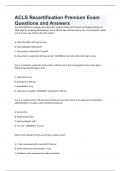
ACLS Recertification Premium Exam Questions and Answers
A pt with STEMI has ongoing chest dicomfort. Heparin 4000 units IV bolus and heparin infusion of 1000 units/hr are being administered. The pt did not take ASA because he has a hx of gastritis, which was tx 5 years ago. What is the next action? A. Give ASA 160 to 325 mg to chew B. Give clopidogrel 300 mg PO C. Give enteric-coated ASA 75 mg PO D. Give enteric-coated ASA 325 mg rectally - ANSWER-A. Give ASA 160 to 325 mg to chew A pt is in pulseless ventricular tachycardia. 2 shocks and 1...
- Package deal
- Exam (elaborations)
- • 9 pages •
A pt with STEMI has ongoing chest dicomfort. Heparin 4000 units IV bolus and heparin infusion of 1000 units/hr are being administered. The pt did not take ASA because he has a hx of gastritis, which was tx 5 years ago. What is the next action? A. Give ASA 160 to 325 mg to chew B. Give clopidogrel 300 mg PO C. Give enteric-coated ASA 75 mg PO D. Give enteric-coated ASA 325 mg rectally - ANSWER-A. Give ASA 160 to 325 mg to chew A pt is in pulseless ventricular tachycardia. 2 shocks and 1...
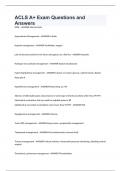
ACLS A+ Exam Questions and Answers
ROSC - ANSWER-Normal state Hypovolemia Management - ANSWER-Iv fluids Hypoxia management - ANSWER-Ventilation, oxygen Lack of electrical activity in the heart and appears as a flat line - ANSWER-Asystole Hydrogen ion (acidosis) management - ANSWER-Sodium bicarbonate hyper/hypokalemia management - ANSWER-Calcium cl, insulin, glucose, sodium bicarb, dialysis Hypo give K Hypothermia management - ANSWER-Rewarming, o2, IVF Absence of detectable pulse and presence of some type of...
- Package deal
- Exam (elaborations)
- • 4 pages •
ROSC - ANSWER-Normal state Hypovolemia Management - ANSWER-Iv fluids Hypoxia management - ANSWER-Ventilation, oxygen Lack of electrical activity in the heart and appears as a flat line - ANSWER-Asystole Hydrogen ion (acidosis) management - ANSWER-Sodium bicarbonate hyper/hypokalemia management - ANSWER-Calcium cl, insulin, glucose, sodium bicarb, dialysis Hypo give K Hypothermia management - ANSWER-Rewarming, o2, IVF Absence of detectable pulse and presence of some type of...
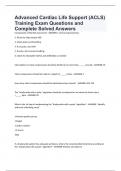
Advanced Cardiac Life Support (ACLS) Training Exam Questions and Complete Solved Answers
Components of the BLS assessment - ANSWER-1. Check responsiveness 2. Shout for help and get AED 3. Check pulse and breathing 4. If no pulse, start CPR 5. If pulse, start rescue breathing 6. Check for shockable rhythm and defibrillate as needed Interruptions in chest compressions should be limited to no more than _____ seconds - ANSWER-10 Chest compressions should be made to a depth of _____ inches - ANSWER-2 How many chest compressions should be administered per minute? - ANSWER-10...
- Package deal
- Exam (elaborations)
- • 4 pages •
Components of the BLS assessment - ANSWER-1. Check responsiveness 2. Shout for help and get AED 3. Check pulse and breathing 4. If no pulse, start CPR 5. If pulse, start rescue breathing 6. Check for shockable rhythm and defibrillate as needed Interruptions in chest compressions should be limited to no more than _____ seconds - ANSWER-10 Chest compressions should be made to a depth of _____ inches - ANSWER-2 How many chest compressions should be administered per minute? - ANSWER-10...
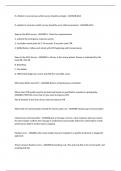
ACLS Class Exam Questions and Answers Graded A+
common Causes of PEA that start with "H" - ANSWER-Hypovolemia, hypoxia, hydrogen ion, hyper/hypokalemia, hypothermia Common Causes of PEA that start with "T" - ANSWER-Tension pneumo, tamponade, thrombosis (pulmonary), thrombosis (Coronary) ST elevations - ANSWER-indicating Injury ST depressions - ANSWER-indicating ischemia Most common symptom of myocardial ischemia and infarction is - ANSWER-retrosternal chest discomfort Fibrolytic therapy - ANSWER-within 30 mins PCI treatm...
- Package deal
- Exam (elaborations)
- • 4 pages •
common Causes of PEA that start with "H" - ANSWER-Hypovolemia, hypoxia, hydrogen ion, hyper/hypokalemia, hypothermia Common Causes of PEA that start with "T" - ANSWER-Tension pneumo, tamponade, thrombosis (pulmonary), thrombosis (Coronary) ST elevations - ANSWER-indicating Injury ST depressions - ANSWER-indicating ischemia Most common symptom of myocardial ischemia and infarction is - ANSWER-retrosternal chest discomfort Fibrolytic therapy - ANSWER-within 30 mins PCI treatm...
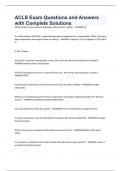
ACLS Exam Questions and Answers with Complete Solutions
What rhythm is most common following cardiac arrest in adults? - ANSWER-VF For adult patients with ROSC, targeted temperature management is recommended. What is the goal body temperature and length of time of cooling? - ANSWER-a. Begin at 32 to 36 degrees C (89.6-96.8 F) b. For 24 hours During CPR, waveform capnography is less than 10 mm Hg. What may improve this number? - ANSWER-Improve chest compressions If PETCO2 abruptly increases to a normal value of 35 - 40 mm Hg, what would y...
- Package deal
- Exam (elaborations)
- • 7 pages •
What rhythm is most common following cardiac arrest in adults? - ANSWER-VF For adult patients with ROSC, targeted temperature management is recommended. What is the goal body temperature and length of time of cooling? - ANSWER-a. Begin at 32 to 36 degrees C (89.6-96.8 F) b. For 24 hours During CPR, waveform capnography is less than 10 mm Hg. What may improve this number? - ANSWER-Improve chest compressions If PETCO2 abruptly increases to a normal value of 35 - 40 mm Hg, what would y...
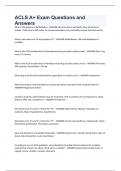
ACLS A+ Exam Questions and Answers
What is the purpose of defibrillation - ANSWER-Stuns the heart and briefly stops all electrical activity- if the heart is still viable, its normal pacemakers may eventually resume electrical activity What is the initial tx of VF and pulseless VT? - ANSWER-Defibrillation. CPR until defibrillator is available What is the ACLS standard dose of Epinephrine during an adult cardiac arrest? - ANSWER-Give 1 mg every 3-5 minutes What is the ACLS standard dose of Amiodarone during an adult card...
- Package deal
- Exam (elaborations)
- • 2 pages •
What is the purpose of defibrillation - ANSWER-Stuns the heart and briefly stops all electrical activity- if the heart is still viable, its normal pacemakers may eventually resume electrical activity What is the initial tx of VF and pulseless VT? - ANSWER-Defibrillation. CPR until defibrillator is available What is the ACLS standard dose of Epinephrine during an adult cardiac arrest? - ANSWER-Give 1 mg every 3-5 minutes What is the ACLS standard dose of Amiodarone during an adult card...
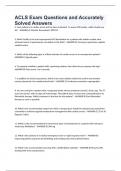
ACLS Exam Questions and Accurately Solved Answers
2. Your patient is in cardiac arrest and has been intubated. To assess CPR quality, which should you do? - ANSWER-A) Monitor the patient's PETCO2 3. Which facility is the most appropriate EMS destination for a patient with sudden cardiac who achieved return of spontaneous circulation in the field? - ANSWER-D) Coronary reperfusion-capable medical center 4. Which of the following signs is a likely indicator of cardiac arrest in an unresponsive patient? - ANSWER-C) Agonal gasps 6. To pro...
- Package deal
- Exam (elaborations)
- • 5 pages •
2. Your patient is in cardiac arrest and has been intubated. To assess CPR quality, which should you do? - ANSWER-A) Monitor the patient's PETCO2 3. Which facility is the most appropriate EMS destination for a patient with sudden cardiac who achieved return of spontaneous circulation in the field? - ANSWER-D) Coronary reperfusion-capable medical center 4. Which of the following signs is a likely indicator of cardiac arrest in an unresponsive patient? - ANSWER-C) Agonal gasps 6. To pro...
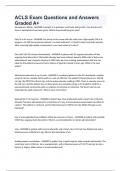
ACLS Exam Questions and Answers Graded A+
Amiodarone 300mg - ANSWER-A patient is in pulseless ventricular tachycardia. Two shocks and 1 dose of epinephrine have been given. Which drug should be given next? Gain IV or IO access - ANSWER-You arrive on the scene with the code team. High-quality CPR is in progress. An AED has previously advised "no shock indicated". A rhythm check now finds asystole. After resuming high-quality compressions, your next action is to what? Give ASA 160-325 chewed immediately - ANSWER-A patient with ST...
- Package deal
- Exam (elaborations)
- • 4 pages •
Amiodarone 300mg - ANSWER-A patient is in pulseless ventricular tachycardia. Two shocks and 1 dose of epinephrine have been given. Which drug should be given next? Gain IV or IO access - ANSWER-You arrive on the scene with the code team. High-quality CPR is in progress. An AED has previously advised "no shock indicated". A rhythm check now finds asystole. After resuming high-quality compressions, your next action is to what? Give ASA 160-325 chewed immediately - ANSWER-A patient with ST...
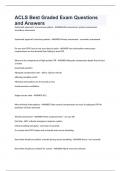
ACLS Best Graded Exam Questions and Answers
Systematic approach- Unconscious patient - ANSWER-BLS assessment, primary assessment, secondary assessment Systematic approach conscious patient - ANSWER-Primary assessment - secondary assessment Do you start CPR if you're not sure about a pulse - ANSWER-Yes exclamation unnecessary compressions are less harmful than failing to start CPR What are the components of high-quality CPR - ANSWER-Adequate compression depth that at least 2 inches Good body position Adequate compression rate ...
- Package deal
- Exam (elaborations)
- • 4 pages •
Systematic approach- Unconscious patient - ANSWER-BLS assessment, primary assessment, secondary assessment Systematic approach conscious patient - ANSWER-Primary assessment - secondary assessment Do you start CPR if you're not sure about a pulse - ANSWER-Yes exclamation unnecessary compressions are less harmful than failing to start CPR What are the components of high-quality CPR - ANSWER-Adequate compression depth that at least 2 inches Good body position Adequate compression rate ...
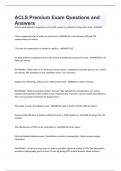
ACLS Premium Exam Questions and Answers
-An adult patient in respiratory arrest with a pulse is ventilated via bag valve mask: -ANSWER- Chest compressions for an adult are performed: -ANSWER-At a rate between 100 and 120 compressions per minute -The ratio of compressions to breaths in adults is: -ANSWER-30:2 An adult patient in respiratory arrest with a pulse is ventilated via bag valve mask: -ANSWER-10 to 12 times per minute (RATIONALE - When there is no advanced airway in place, ventilations should be given 10 to 12 ti...
- Package deal
- Exam (elaborations)
- • 4 pages •
-An adult patient in respiratory arrest with a pulse is ventilated via bag valve mask: -ANSWER- Chest compressions for an adult are performed: -ANSWER-At a rate between 100 and 120 compressions per minute -The ratio of compressions to breaths in adults is: -ANSWER-30:2 An adult patient in respiratory arrest with a pulse is ventilated via bag valve mask: -ANSWER-10 to 12 times per minute (RATIONALE - When there is no advanced airway in place, ventilations should be given 10 to 12 ti...
